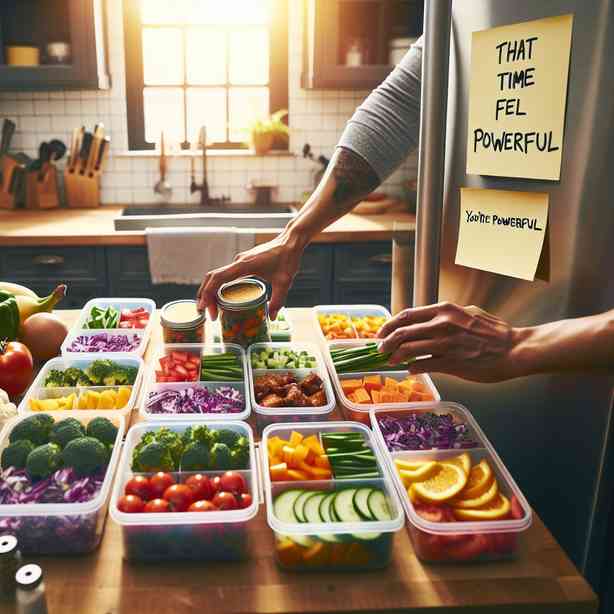
Meal prepping is a practice that has gained significant traction in recent years, and for good reason. It allows individuals to take control of their diets, save time during the week, and even save money by reducing food waste. The concept may seem simple—preparing meals in advance—but its impact can be profound, especially when done correctly. Let’s explore the multifaceted benefits of meal prepping and how it can empower anyone looking to lead a healthier lifestyle.
To begin, let’s discuss what meal prepping entails. Essentially, it involves preparing and cooking meals in advance, usually for the week ahead. This can take various forms: some may choose to prepare full meals that can be reheated, while others might opt for chopping vegetables, cooking grains, or preparing proteins that can be assembled quickly throughout the week. The beauty of meal prepping is that it can be tailored to fit individual lifestyles, dietary needs, and preferences.
One of the most empowering aspects of meal prepping is the control it gives over one’s diet. In today’s fast-paced world, it’s all too easy to succumb to unhealthy food choices when hunger strikes. With pre-prepared meals on hand, however, the temptation to grab fast food or junk food significantly diminishes. Instead, individuals can make healthier choices effortlessly. Having nutritious meals readily available not only satisfies hunger but also supports health and wellness goals.
In addition to controlling dietary choices, meal prepping can lead to significant time savings during the week. By dedicating a few hours on the weekend to cooking and portioning meals, individuals can free up valuable time on busy weekdays. Instead of spending time cooking every day or deciding what to eat, everything is prepared in advance. This allows more time for family, hobbies, or simply relaxing after a busy day. The convenience of meal prepping cannot be overstated; it essentially streamlines daily routines and minimizes stress around meal times.
Moreover, meal prepping can be a game changer for those looking to adhere to a budget. Preparing meals at home is generally more cost-effective than dining out or relying on convenience foods. When you buy ingredients in bulk and prepare them yourself, you often end up spending significantly less. Additionally, meal prepping reduces food waste as it encourages individuals to use the ingredients they have on hand and plan meals accordingly. By being intentional about what you cook and eat, you can make the most out of every dollar spent on groceries.
In terms of health, the benefits of meal prepping are manifold. When you plan and prepare your meals, you can ensure that they are balanced and nutritious. This level of foresight allows you to incorporate a variety of food groups—lean proteins, whole grains, healthy fats, and plenty of fruits and vegetables. The result is not only delicious meals but also a well-rounded dietary intake, which can contribute to improved overall health. Meal prepping can also help with portion control, as pre-measured servings can prevent overeating and promote mindfulness about food choices.
For those who are new to meal prepping, getting started can appear daunting. However, it doesn’t have to be. Begin with simple recipes that require minimal ingredients. Focus on a few staple meals that you enjoy and practice making those until you feel comfortable enough to explore more complex dishes. It can be helpful to dedicate a specific day and time for meal prep to ensure consistency. Create a shopping list based on the recipes you’ve chosen to minimize impulse buying and ensure you have everything you need.
Another essential tip is to invest in quality containers for storage. Having an organized system for your meals not only makes it easier to manage your food but also keeps your fridge tidy. Glass containers with airtight lids are highly recommended for storing meals, as they prevent spills and maintain freshness. Labeling containers with dates can help in tracking how long meals have been stored, ensuring that everything is consumed while still fresh.
As you delve deeper into meal prepping, you may start to experiment with various cooking techniques and cuisines. Spice up your routine by incorporating different flavors and textures. This will not only keep your meals exciting but also expose you to new culinary skills and nutritional benefits. Furthermore, inviting family or friends to join you in the meal prepping process can be a fun way to share the experience and enjoy some quality time together.
However, remember that meal prepping is not a rigid practice; it should serve you and your lifestyle. If you find that preparing a full week’s worth of meals feels overwhelming, consider starting with just a couple of lunch options to get your feet wet. The goal is to create a sustainable habit that fits within your life rather than something that adds extra stress.
In conclusion, meal prepping is more than just a practical approach to food management; it is an empowering tool that fosters healthier living, improves time efficiency, and promotes financial savings. By investing time into planning and preparing meals, individuals can cultivate a greater sense of control over their health and well-being. Through the practice of meal prepping, you will not only enhance your cooking skills but also embrace a lifestyle that prioritizes nourishment and convenience. Whether you are looking to eat healthier, save money, or manage your time better, meal prepping is a transformative practice worth exploring. Start small, stay consistent, and you will find yourself reaping the benefits of this powerful self-care strategy.


